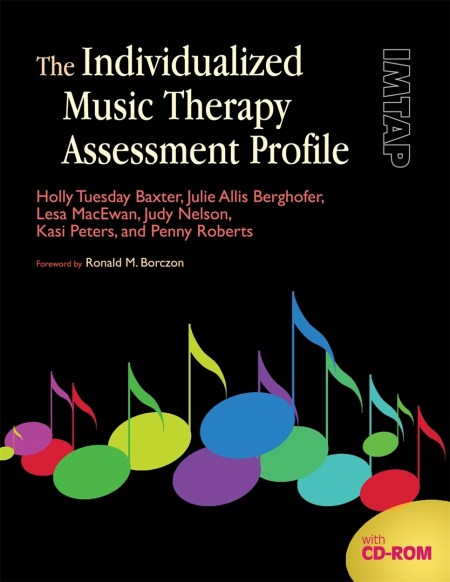The Individualized Music Therapy Assessment Profile
On sale
15th December 2007
Price: £47.99
Genre
Medicine / Nursing & Ancillary Services / Occupational Therapy / Creative Therapy (eg Art, Music, Drama)
Selected:
ebook / ISBN-13: 9781846427466
The Individualized Music Therapy Assessment Profile (IMTAP) is an in-depth assessment protocol developed by a team of six experienced music therapists. Designed for use in pediatric and adolescent settings, it provides a clear profile of each client over time. The accompanying online downloadable material allows the therapist to store client details, and to create charts showing progress and areas to work on.
The book includes sample assessment sessions and examples of activities and interventions. The IMTAP may be used on a variety of levels:
* as a treatment plan for music therapy work
* as a tool to develop goals and objectives
* as a means to address and assess targeted skill sets
* as an indicator of overall functioning to provide a baseline for treatment
* as a research method
* as a communication tool for parents and healthcare professionals.
The IMTAP is simple to use and yields detailed information on client abilities and functioning from intake through treatment planning. It identifies effective strategies for each client, making it an essential tool for students and professionals in the field of music therapy.
The downloadable resources that form part of this book include the IMTAP software, used for client management, data collection, and assessment scoring. As this software was originally created in 2007, it is no longer supported on Mac OSX, and it is not guaranteed to work reliably on Windows.
The book includes sample assessment sessions and examples of activities and interventions. The IMTAP may be used on a variety of levels:
* as a treatment plan for music therapy work
* as a tool to develop goals and objectives
* as a means to address and assess targeted skill sets
* as an indicator of overall functioning to provide a baseline for treatment
* as a research method
* as a communication tool for parents and healthcare professionals.
The IMTAP is simple to use and yields detailed information on client abilities and functioning from intake through treatment planning. It identifies effective strategies for each client, making it an essential tool for students and professionals in the field of music therapy.
The downloadable resources that form part of this book include the IMTAP software, used for client management, data collection, and assessment scoring. As this software was originally created in 2007, it is no longer supported on Mac OSX, and it is not guaranteed to work reliably on Windows.
Newsletter Signup
By clicking ‘Sign Up,’ I acknowledge that I have read and agree to Hachette Book Group’s Privacy Policy and Terms of Use
Reviews
Assessment scales that are comprehensive and systematically developed and tested are needed in music therapy to ensure clinicians are providing the most appropriate therapy programs and that client progress is accurately evaluated. The Individualized Music Therapy Assessment Profile (IMTAP) contributes to addressing this need. The scoring system is sophisticated and does produce a comprehensive profile of the client's abilities and impairments. A particular feature that was impressive in this assessment tool is the capacity to review skills that cross-domains.The comprehensive assessment of musicality is especially impressive, with specific musical activities provided.
For students of music therapy, the "Individualized Music Therapy Assessment Profile" is a unique resource and an excellent guide on the jouney towards becoming a reflective practitioner.
I find the Individualized Music Therapy Assessment Profile: IMTAP to be a significant contribution to the existing literature on music therapy assessment with children. The forms are clearly drawn and user-friendly, and, with appropriate musical tasks developed by the clinician, can provide a wealth of information in determining the need for music therapy services.
The importance of valid and reliable assessment tools in the profession of music therapy is critical to practice. The introduction of the IMTAP by this team represents considerable effort that clearly contributes in the area of assessment and documentation among children with special needs. The novel aspects of this instrument are that it uses music activity as the medium for evaluation and it offers a reliable format for an important array of domains suitable for review across disciplines. I look forward to the use of this instrument in practice and as part of future psychometric and outcomes research in music therapy and special education.
The Individualized Music Therapy Assessment Profile is an important addition to the music therapy literature. Assessment is a crucial component of music therapy practice, yet few standardized assessment tests have been published. The IMTAP is a thorough and well-substantiated assessment tool. This book should be in every music therapist's library.

